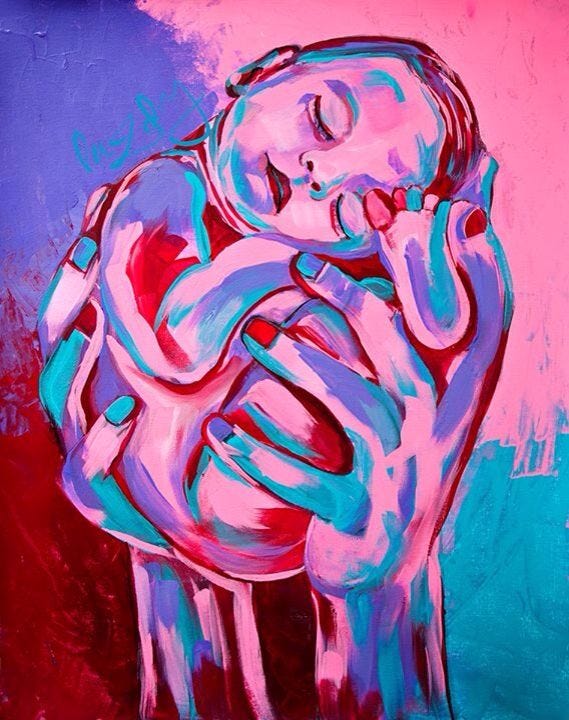From Confinement to Enlightenment

In the journey of life, many of us encounter feelings of being trapped or confined, as if surrounded by invisible walls. This experience can be likened to a child in the womb. Initially, as the child’s physical body forms, its cognitive and emotional faculties begin to interact with the world through this developing form. The baby, cocooned in this enclosure, kicks and pushes against the confines of the womb, experiencing a world of muffled sounds and dim light. In this stage, the child may develop a sense of separation and isolation from its surroundings, accompanied by feelings of helplessness or despair, unable to see any path to freedom.
Just as the child in the womb develops in ways beyond its understanding, preparing for a life it cannot yet conceive, our spiritual growth, too, often unfolds in unseen ways, shaping us for a reality beyond our current comprehension.
The child in the womb cannot leave at will; it must wait patiently for the natural process to unfold, allowing the mother’s body to signal the right time for birth. The womb, though at times uncomfortable, serves as a sanctuary, protecting and nurturing the child until it is ready to face the unknown world outside. Similarly, our life’s struggles and the walls we encounter are not mere barriers but can be seen as protective, nurturing forces. They are integral to our growth and development, preparing us for what lies ahead.
The bhakti wisdom text, the Srimad Bhagavatam illuminates this concept. A verse in the 11th canto describes the human body as a rare and valuable vessel, like a well-constructed boat, meant for navigating the ocean of material existence. Guided by the spiritual teacher (the captain) and propelled by the divine instructions (favorable winds), this body offers us the unique opportunity for spiritual growth and liberation.
Life is not about seeking an immediate exit from our struggles and limitations. Instead, it’s about recognizing that these very experiences are shaping us, strengthening us, and preparing us for a reality beyond our current understanding. Like the child in the womb, who might feel hopeless and helpless, unaware of the vast world that awaits, we too might feel confined by our present circumstances. Yet, in this space of growth, we are being readied for something much greater.
The Bhakti tradition emphasizes grace as a key element to awakening. To attract grace, one must practice the art of surrender and devotion. The practices of devotion and surrender are not mere rituals; they are profound preparations, aligning our hearts and minds for the moment when the doors to a higher spiritual reality gracefully open, revealing a world we are yet to imagine. And, these practices do more than prepare us for a new spiritual reality. They transform our very perception of our current reality. As we engage in these practices, what once felt like confining walls begin to resemble the nurturing boundaries of a cocoon, within which we undergo a profound metamorphosis. This transformation redefines our understanding of freedom and confinement, revealing that our spiritual evolution is not a mere escape from challenges but a transcendental embrace of them, leading to an enlightened perspective.
Grace, or divine intervention, will guide us through these transitions when the time is right. It is through divine grace that we are eventually led out of our metaphorical womb into a new, expansive reality, one that we can not imagine or grasp with our current paradigms. This transition is not something we can force; much like the child cannot hasten its birth, we cannot rush our spiritual awakening. Our role is to prepare, to cultivate spiritual qualities and understanding, so that when the door to this new reality opens, we are ready to embrace it.
Thus, life is not about seeking an escape from our perceived imprisonment but is more about preparing for the moment when the doors finally open. It is about developing patience, understanding, and the strength to face the new realities that await us.
Just as the child eventually leaves the womb at the appropriate time, we too will find our paths opening when the moment is ripe. This perspective invites us to embrace our challenges, understand their purpose in our growth, and cultivate patience and faith, trusting that the journey of life, with all its confinements and struggles, is leading us toward a greater awakening.
I will leave you with a paraphrased interpretation of a verse from the Bhagavad Gita’s 9th chapter:
“In this impermanent and sometimes joyless world, dedicate yourself to spiritual practice. Surrender to the divine rhythm of life, embracing its ebbs and flows without resistance, for such unwavering devotion leads to the eternal.”
